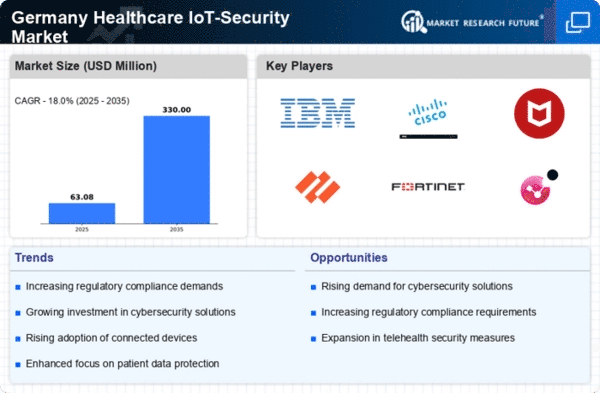Rising Cybersecurity Threats
The healthcare IoT security market in Germany is experiencing heightened demand due to the increasing frequency and sophistication of cyberattacks targeting healthcare systems. In recent years, the number of reported breaches has surged, prompting healthcare organizations to prioritize security measures. This trend is underscored by a report indicating that over 50% of healthcare providers in Germany have faced cyber incidents, leading to significant financial losses. As a result, investments in advanced security solutions are becoming essential to protect sensitive patient data and maintain operational integrity. The urgency to address these threats is driving growth in the healthcare IoT security market, as organizations seek to implement robust security frameworks to mitigate risks and ensure compliance with stringent regulations.
Rising Awareness of Cybersecurity Risks
There is a growing awareness among healthcare stakeholders in Germany regarding the risks associated with cybersecurity. As incidents of data breaches and cyberattacks become more prevalent, healthcare organizations are increasingly recognizing the importance of investing in security measures. Educational initiatives and industry collaborations are fostering a culture of security awareness, prompting organizations to prioritize cybersecurity in their strategic planning. This heightened awareness is driving demand for solutions within the healthcare IoT security market, as stakeholders seek to protect sensitive patient information and maintain trust in their services. Consequently, the market is expected to experience growth as organizations implement proactive security measures to address these emerging risks.
Regulatory Pressures for Data Protection
In Germany, stringent data protection regulations are significantly influencing the healthcare IoT security market. The implementation of the General Data Protection Regulation (GDPR) has heightened the focus on safeguarding personal data, particularly in the healthcare sector. Organizations are now required to adopt robust security measures to comply with these regulations, which can result in substantial fines for non-compliance. This regulatory landscape is driving healthcare providers to invest in advanced security technologies and practices to protect patient information. As a result, the healthcare IoT security market is likely to expand as organizations strive to meet regulatory requirements while ensuring the confidentiality and integrity of sensitive data.
Growing Adoption of Connected Medical Devices
The proliferation of connected medical devices in Germany is a key driver for the healthcare IoT security market. As hospitals and clinics increasingly integrate IoT-enabled devices for patient monitoring and treatment, the potential for security vulnerabilities rises. A recent study suggests that the number of connected devices in healthcare settings is expected to reach 50 million by 2026, amplifying the need for comprehensive security solutions. This trend compels healthcare providers to invest in security measures that safeguard these devices from unauthorized access and data breaches. Consequently, the healthcare IoT security market is poised for growth as organizations recognize the necessity of protecting their interconnected systems and ensuring patient safety.
Increased Investment in Healthcare Infrastructure
Germany's commitment to enhancing its healthcare infrastructure is a significant driver for the healthcare IoT security market. The government has allocated substantial funding to modernize healthcare facilities and integrate advanced technologies. This investment includes the deployment of IoT devices and systems that require robust security measures to protect against potential threats. As healthcare organizations upgrade their infrastructure, the demand for security solutions is expected to rise. The healthcare IoT security market is likely to benefit from this trend, as organizations seek to implement comprehensive security strategies that align with their modernization efforts and ensure the safety of patient data.
















